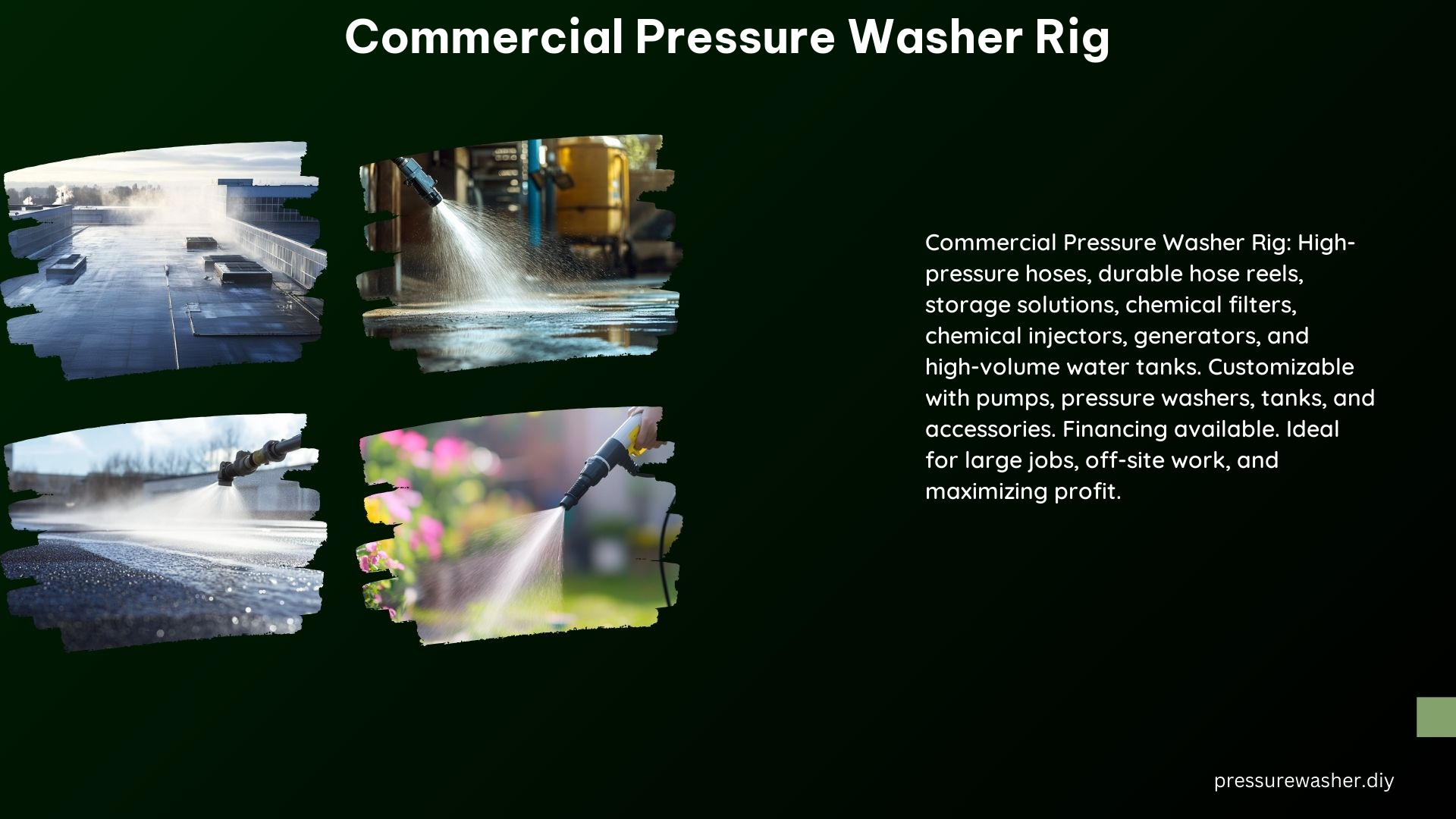A commercial pressure washer rig is a heavy-duty, mobile cleaning system designed for professional use. These rigs are typically mounted on a trailer and equipped with powerful pumps, high-pressure hoses, and other necessary equipment for efficient and effective cleaning. This comprehensive guide will delve into the key features, technical specifications, and the differences between commercial and residential pressure washers, providing you with a detailed playbook to make an informed decision when selecting the right commercial pressure washer rig for your heavy-duty cleaning needs.
Power and Pressure
The power and pressure capabilities of a commercial pressure washer rig are crucial factors to consider. These rigs are designed to handle more demanding cleaning tasks, with a range of pressure and flow rates to suit various applications.
PSI (Pounds per Square Inch)
Commercial pressure washers typically range from 2,000 to 5,000 PSI, with higher pressures suitable for more challenging cleaning jobs. For example, the Pressure Pro Pro Super Skid Trailer 8.0 @ 3500 model delivers an impressive 3,500 PSI, while the BCE Cleaning Systems Hydro Max line offers models with pressures up to 5,000 PSI.
GPM (Gallons per Minute)
Flow rates for commercial pressure washer rigs vary from 2 to 10 GPM, with higher flow rates ideal for larger areas or heavy-duty cleaning tasks. The Pressure Pro – HD Commercial Tow Pro Trailer 4@4000 model boasts a flow rate of 4.0 GPM, while the BCE Cleaning Systems Hydro Max line includes models with flow rates up to 10 GPM.
Pump Type

Commercial pressure washer rigs can be equipped with different types of pumps, each with its own advantages for specific applications.
Gasoline or Diesel Engine
Gasoline or diesel-powered engines are suitable for remote or off-grid operations where electricity is not readily available. These engine-driven pumps provide the necessary power and mobility for cleaning tasks in areas without access to a reliable power source.
Electric Motor
Electric-powered pressure washer rigs are ideal for operations with access to a power source, such as in-plant or facility-based cleaning tasks. These models offer the convenience of a plug-and-play setup, eliminating the need for fuel storage and maintenance associated with engine-driven units.
Water Tank Capacity
The size of the water tank on a commercial pressure washer rig can range from 50 to 500 gallons, depending on the job requirements and water availability. Larger tanks, such as the 200-gallon tank on the Pressure Pro Pro Super Skid Trailer 8.0 @ 3500 model, provide extended runtime and reduce the need for frequent refilling, improving productivity and efficiency.
Hose and Wand
The hose and wand assembly are critical components of a commercial pressure washer rig, as they directly impact the reach and versatility of the cleaning system.
Length and Material
Commercial pressure washer rigs typically feature longer hoses, up to 100 feet, to provide greater coverage and accessibility. These hoses are often made of durable materials like steel or polyurethane to withstand the high pressures and frequent use.
Nozzle Types
A variety of nozzle types, such as 0°, 15°, 25°, and 40°, are available for commercial pressure washer rigs, allowing operators to select the appropriate nozzle for different cleaning tasks and surface types.
Storage and Organization
Efficient storage and organization of accessories, chemicals, and other equipment are essential for the smooth operation of a commercial pressure washer rig.
Toolboxes and Compartments
Commercial pressure washer rigs often feature ample storage space, including toolboxes and compartments, to keep all necessary items readily accessible and organized, improving productivity and reducing downtime.
Mobility and Towing
The mobility and towing capabilities of a commercial pressure washer rig are crucial for its versatility and ease of use.
Trailer Type
Commercial pressure washer rigs are typically mounted on single or tandem axle trailers, with some models, like the Pressure-Pro – HD Commercial Tow Pro Trailer 4@4000, featuring forklift channels for easy placement and relocation.
Towing Capacity
When selecting a commercial pressure washer rig, it is essential to ensure that the towing vehicle has the necessary capacity to handle the weight of the fully loaded trailer, which can range from several hundred to over a thousand pounds, depending on the model and configuration.
Safety Features
Safety is a paramount concern when operating a commercial pressure washer rig, and these systems are equipped with various features to protect the operator and ensure safe operation.
Safety Valves
Commercial pressure washer rigs are equipped with safety valves that prevent over-pressurization, safeguarding the system and the operator from potential hazards.
Ground Fault Protection
Many commercial pressure washer rigs, especially those with electric motors, feature ground fault protection to shield operators from the risk of electrical shock, enhancing the overall safety of the cleaning system.
Customization
Commercial pressure washer rigs offer a high degree of customization to meet the specific needs of various cleaning applications.
Specialized Equipment
Options like chemical injectors, filters, and generators can be added or customized to the commercial pressure washer rig, allowing operators to tailor the system to their unique requirements and enhance its capabilities.
Technical Specifications
To provide a more detailed understanding of the capabilities of commercial pressure washer rigs, let’s examine the technical specifications of a few models:
- Pressure Pro Pro Super Skid Trailer 8.0 @ 3500:
- Flow Rate: 8.0 GPM
- Pressure: 3,500 PSI
- Water Tank Capacity: 200 gallons
-
Hose Reel Length: 20 feet
-
Pressure-Pro – HD Commercial Tow Pro Trailer 4@4000:
- Flow Rate: 4.0 GPM
- Pressure: 4,000 PSI
- Water Tank Capacity: 150 gallons
-
Forklift Channels for Easy Placement
-
BCE Cleaning Systems Hydro Max:
- Flow Rates: 5 to 10 GPM
- Pressures: Up to 5,000 PSI
- Options for Hot or Cold Water
- Various Engine Types (Gasoline or Diesel)
Comparison to Residential Pressure Washers
While both commercial and residential pressure washers share the common goal of cleaning, there are significant differences in their power, durability, and specialized features.
Higher Pressure and Flow Rates
Commercial pressure washer rigs are designed to handle more demanding cleaning tasks, with the ability to produce higher pressures (up to 5,000 PSI) and flow rates (up to 10 GPM) compared to residential washers (typically up to 2,000 PSI and 2 GPM).
Heavy-Duty Construction
Commercial pressure washer rigs are built with more durable materials and designed for frequent, heavy use, ensuring a longer lifespan and reliable performance, even in the most challenging cleaning environments.
Customization and Specialized Equipment
Commercial pressure washer rigs often include specialized equipment like chemical injectors, filters, and generators, which are not typically found in residential washers, allowing for greater versatility and tailored cleaning solutions.
By understanding the key features, technical specifications, and the differences between commercial and residential pressure washers, you can make an informed decision when selecting the right commercial pressure washer rig for your heavy-duty cleaning needs.
References
- Power Wash Store. (n.d.). Custom Built Pressure Washer Trailers & Skids. Retrieved from https://www.powerwashstore.com/C/173/Pressure-Washer-Trailers
- Power Line Industries. (n.d.). Trailer Mounted Power Washers. Retrieved from https://powerlineindustries.com
- Power Cleaning Systems. (n.d.). Trailer Pressure Washers. Retrieved from https://www.powercleaningsystems.com/trailer-pressure-washers
- Pressure Washers Direct. (n.d.). Commercial Trailer Pressure Washers. Retrieved from https://www.pressurewashersdirect.com/power/commercial-trailer-pressure-washers.html
- BCE Cleaning Systems. (n.d.). Pressure Washer Trailer Packages. Retrieved from https://bcesystems.com/collections/pressure-washer-trailer-packages
